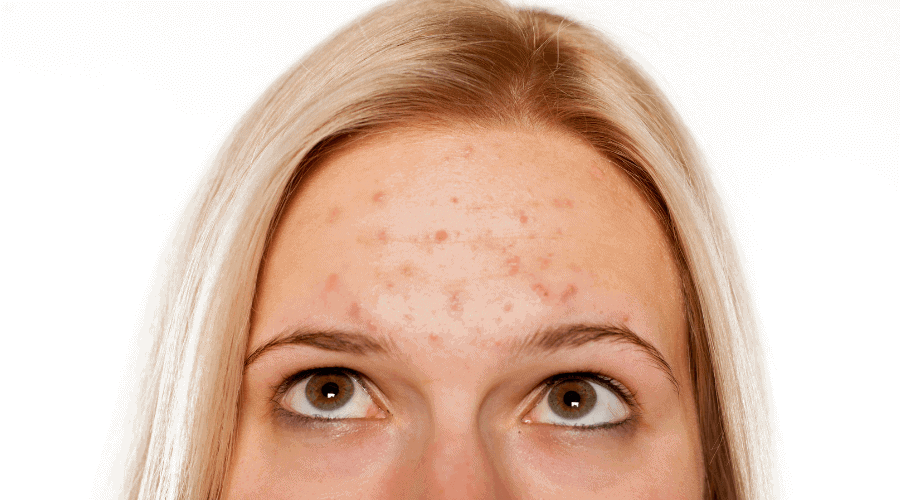We often hear that acne is just a teenage problem that will fade away with adulthood. However, for many, acne remains a persistent issue well into their twenties and thirties. When dealing with acne, what you put on your plate matters as much as what you put on your face. While sugary and oily foods are known culprits, eggs have also come under scrutiny. Despite being a nutritional powerhouse, some worry that the hormones in eggs, such as albumin and progesterone, might trigger acne. In this article, we explore whether eggs can cause acne and how you can maintain healthy skin through smart dietary choices.
Do Eggs Cause Acne?
Eggs, in particular, have been under scrutiny.
Some sources suggest that eggs may contribute to acne due to the presence of hormones like progesterone and substances such as iodine, biotin, and albumin.
These components are known to be potential acne triggers for some individuals.
While eggs contain hormones that can influence sebum production, a key factor in acne development, the extent to which they affect individuals can vary greatly.
Some may find that consuming eggs worsens their acne, while others may not notice any change.
The Nutritional Components Of Eggs That May Cause Acne
Eggs are a rich source of nutrients, providing high-quality protein, vitamins, and minerals. However, certain components within eggs have been identified as potential acne triggers:
Albumin
Consuming egg whites, which contain the protein albumin, might trigger an inflammatory response in people with egg allergies or sensitivities. This response could potentially contribute to facial inflammation and acne.
Hormones
Eggs contain small amounts of hormones like progesterone. While theoretically possible, these trace amounts are unlikely to significantly disrupt hormonal balance and lead to acne in most people.
Iodine
Eggs contain iodine, but the amount is unlikely to be a significant factor for acne development in most individuals.
Biotin
Eggs are rich in biotin, a vitamin B important for skin health. However, high biotin intake might interfere with the absorption of other B vitamins involved in oil regulation. This could contribute to acne in some cases, but more research is needed.
Individualized Impact
It's important to remember that these components don't necessarily cause acne in everyone. The impact of eggs on acne varies greatly between people. Factors like genetics, overall diet, and skin type play significant roles.
Egg Whites Or Yolk: Which Causes Acne?
The science on eggs and acne isn't black and white, so neither whites nor yolks are a guaranteed culprit. Here's an analysis of the potential factors:
- Egg whites: For people with egg allergies or sensitivities, consuming egg whites, which contain the protein albumin, might trigger an inflammatory response. This response could potentially contribute to facial inflammation and acne.
- Egg yolks: The higher fat content could contribute to oily skin and clogged pores in some. Additionally, trace amounts of progesterone in yolks might increase oil production for specific individuals.
Should I Stop Eating Eggs If I Have Acne?
While eggs offer valuable protein and vitamins, certain components might worsen acne for those sensitive to particular ingredients.
Here's why eggs could be problematic for some:
- Hormonal content: Eggs contain hormones such as progesterone, potentially contributing to breakouts in susceptible individuals.
- Possible triggers: Elevated levels of iodine, biotin, and albumin in eggs may also trigger acne in certain people.
It's crucial to note that scientific understanding in this area is still evolving, and the impact of diet on acne varies significantly among individuals.
The decision of whether or not to eliminate eggs from your diet should be taken only after consulting a qualified dermatologist.
Impact Of Egg Allergy On Skin Health
Egg allergies can lead to various skin problems that can disrupt your daily routine. Here's how eggs can affect your skin health:
- Inflammation and hives: One common reaction is inflammation, often presenting as hives (urticaria). These are raised, itchy red welts that can appear anywhere on your body following egg exposure.
- Mouth-area reactions: Direct contact with eggs may cause localized skin reactions, especially around the mouth. You might notice redness or a rash shortly after touching or consuming eggs.
- Worsening of eczema: An egg allergy can worsen symptoms if you have eczema (atopic dermatitis), leading to more frequent and severe flare-ups.
- Chronic skin conditions: Repeated allergic reactions to eggs can contribute to the persistence of chronic skin issues, highlighting the necessity of avoiding egg triggers.
Did You Know? Certain genes can increase your risk for acne. They influence oil production and inflammatory response. Xcode's Gene Skin panel uncovers your risk for acne and provides comprehensive insights into overall skin health.
*reports are generated only using existing ancestry test DNA data. xcode does not ship out DNA kits
Other Common Foods That Cause Acne
Recent research highlights the possibility of dietary factors influencing acne in some individuals, shedding light on potential triggers to be aware of:
Dairy Products
Studies suggest a link between milk consumption, especially during teenage years, and worse acne. Milk might mess with hormones like insulin and IGF-1, worsening breakouts.
Fast Food
It's crucial to note that diets high in fast food, characterized by sugary, greasy, and processed foods, have been linked with increased acne. This type of eating can disrupt your body's hormones and genes, potentially causing breakouts.
Chocolate
Researchers have yet to answer whether chocolate directly causes acne. Some recent studies suggest a connection, but why and how strong it is remains a mystery.
Whey protein
Some worry that the amino acids in whey protein powders might make skin cells grow too fast and clog pores. Also, the effect of whey protein on hormones needs more investigation regarding acne.
Food Sensitivities
Since acne involves inflammation, foods you're sensitive to might worsen breakouts. An elimination diet with a doctor's help can reveal your personal trigger foods.
Tips To Eat Eggs Safely Without Getting Acne
Here are some approaches you can consider to potentially incorporate eggs into your diet while minimizing the risk of acne breakouts:
- Moderate egg consumption: Evaluate your current egg intake. You can explore consuming eggs less frequently throughout the week.
- Dietary diversification: Consider incorporating alternative protein sources like tofu, lentils, or chickpeas into your meals. This can diversify your nutrient intake and reduce overall egg consumption.
- Healthy cooking techniques: Explore healthier methods for preparing eggs. Boiling is a great option compared to frying with excess oil or butter. This can help regulate fat intake, potentially benefiting your skin health.
- Trial elimination and reintroduction: A trial elimination can be implemented if you suspect eggs might be a contributing factor. You can temporarily remove eggs from your diet for one to four weeks. If your acne improves during this time, it suggests a potential link. A gradual reintroduction of eggs in smaller quantities can be attempted. This approach can help identify your tolerance level for eggs.
- Consulting a healthcare professional: Eggs are a valuable source of nutrients. However, if you experience persistent acne concerns, consulting a healthcare professional is recommended. They can provide personalized guidance on managing acne and safely incorporating eggs into your diet.
5 Foods That Can Help Prevent Acne
Here are 5 foods that may be beneficial for preventing acne:
- Fruits and veggies: Packing vitamins, antioxidants, and anti-inflammatory benefits, fruits and vegetables can help fight acne breakouts. A colorful variety brings different skin-helping nutrients to the table.
- Fatty fish: Salmon and similar fish deliver omega-3s that reduce inflammation. This may help prevent acne. A couple of servings a week do the trick.
- Whole grains: Unlike white bread and rice, whole grains give steady, long-lasting energy and balance blood sugar. For some, steady blood sugar could prevent acne triggers.
- Zinc foods: Foods with zinc, such as pumpkin seeds, lentils, and oysters, benefit skin health and healing. Incorporating them into your diet throughout the week can be advantageous.
- Vitamin A vegetables: Sweet potatoes, carrots, spinach, and other vitamin A-rich veggies assist with skin turnover and unclogging pores.
FAQs: Can Eating Eggs Cause Acne?
Is 2 Eggs A Day Bad For The Skin?
Those prone to inflammatory responses and sensitive to hormonal changes may have a higher risk of developing acne due to the albumin and hormones present in eggs.
Do Eggs Help Clear Skin?
Eggs do have certain nutritional components like protein, B vitamins, and selenium, all of which benefit skin health. However, individual responses to eggs vary.
Which Foods Trigger Acne?
Many food and food groups can trigger acne. Some of them are: processed food, sugary foods, dairy, and alcohol.
What Foods Are Best For Acne?
Foods rich in omega-3 fats (like walnuts and salmon), antioxidants (like berries and greens), lean protein (like poultry and tofu), and low glycemic foods can help with acne.
Does Cottage Cheese Cause Acne?
Cottage cheese and other dairy products have been associated with acne. Although there's no direct link, it can aggravate acne and also may trigger acne in those who are predisposed to it.
Summary: Do Eggs Cause Acne?
While eggs are nutritious, some components, such as albumin, hormones, iodine, and biotin, may trigger acne in some people based on genetics, diet, and skin type.
Egg allergies can result in skin problems such as inflammation, hives, and aggravated eczema.
Dairy, fast food, chocolate, whey protein, and food sensitivities are other potential dietary acne triggers.
To reduce acne risk when consuming eggs, try moderate intake, alternative protein sources, healthy cooking methods, and a trial elimination/reintroduction process.
A diet rich in vegetables, fatty fish, fruits, zinc-rich foods, whole grains, and vitamin A vegetables can help reduce acne breakouts.
Consult a healthcare professional for persistent acne concerns and create a personalized plan that may include eggs.
Expert-recommended Reads

How Genes Influence Your Risk For Acne

How Does Genetics Influence Your Risk For Egg Allergy?
References
https://www.medicalnewstoday.com/articles/does-progesterone-cause-acne
https://www.medicalnewstoday.com/articles/320445
https://www.healthline.com/nutrition/foods-that-cause-acne
https://www.ncbi.nlm.nih.gov/pmc/articles/PMC4391699
https://www.ncbi.nlm.nih.gov/pmc/articles/PMC10111601




